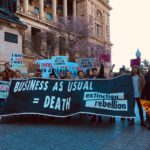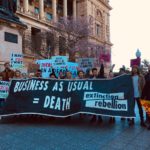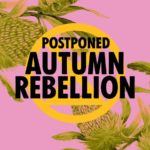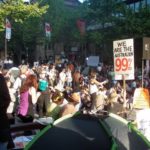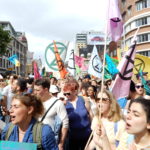Digital Climate Disruption: An Interview With Extinction Rebellion’s AJ Tennant
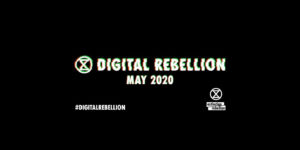
The big four Australian banks – Westpac, Commbank, ANZ and NAB – “collectively poured” around $35.4 billion dollars into the fossil fuel industry over the four years to 2019, Market Forces reported on 7 May. It added that $7.1 billion of this was invested into coal, oil and gas expansion.
A project of Friends of the Earth, Market Forces tracks the financial dealings of banks, superannuation funds and government – institutions that have custody of our money – with the understanding that they should use these finances “to protect not damage our environment”.
“Despite announcing their support for the Paris Agreement, the lending practices of all four major banks tell a different story,” the report continues. “Not one of them takes global warming seriously enough to stop contributing to the crisis fuelling bushfires, floods, storms and drought”.
On Monday morning, Extinction Rebellion Sydney posted the article on its Facebook feed with a message announcing it was conducting an online action: a digital swarm of the social media accounts of those big four local banks to push the message that investment should be sustainable.
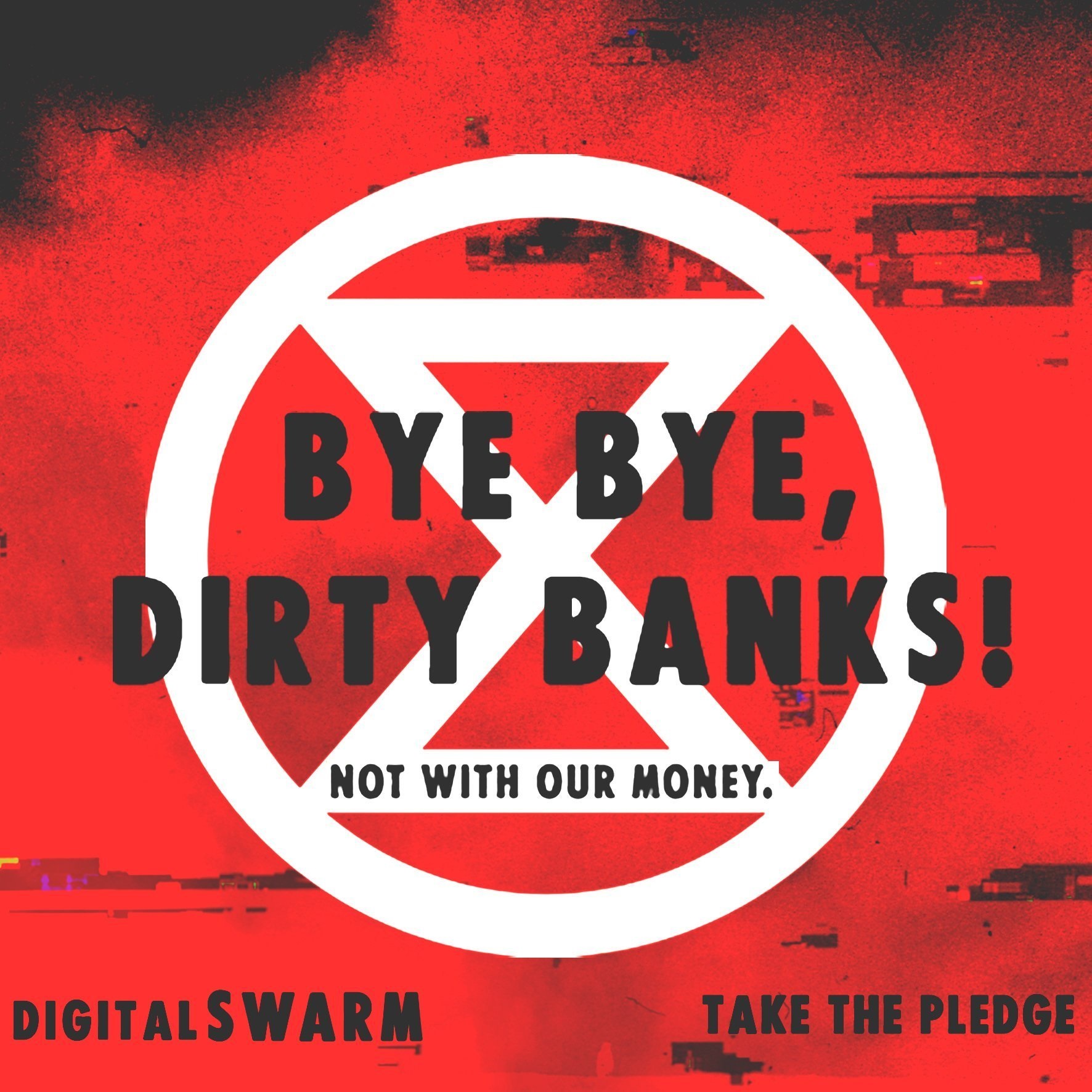
A mask for every crisis
Right now, as you pass people walking down the street wearing masks, it’s easy to forget that just a few months ago, these same face coverings were being donned to protect against pollution from bushfires, rather than guarding against life-threatening COVID-19.
Indeed, the 2019-20 bushfire catastrophe engulfed 20 percent of the nation’s mainland forest. And part of the reason the fires burnt so well was the dryness of the environment in the south east of the country, where a years-long water shortage crisis was ongoing.
As the blazes continued, thousands began taking to the streets to protest “the liar from the Shire” PM Scott Morrison, who throughout the climate-related bushfire crisis continued to deny it had anything to do with the fossil fuel industries his government is so firmly linked to.
The rebellion continues
While the memory of a summer tainted by flames and smoke has now been partially eclipsed by a pandemic that’s shutdown society, the climate and ecological crisis faced by planet Earth hasn’t disappeared.
That’s why Extinction Rebellion (XR) is mobilising online during the lockdown. The global climate movement has just launched its Digital Rebellion, which involves ten days of actions aimed at disrupting climate complicit industries online.
XR made world headlines in April last year, when it shut down parts of London for over a week. And since then, numerous XR chapters have sprung up across Australia, using nonviolent civil disobedience to draw attention to the dire need for system change.
Sydney Criminal Lawyers spoke to Extinction Rebellion Sydney organiser AJ Tennant about what the Digital Rebellion is going to involve, the community building the group is engaged in during the pandemic and what the public should expect once the lockdown restrictions are lifted.
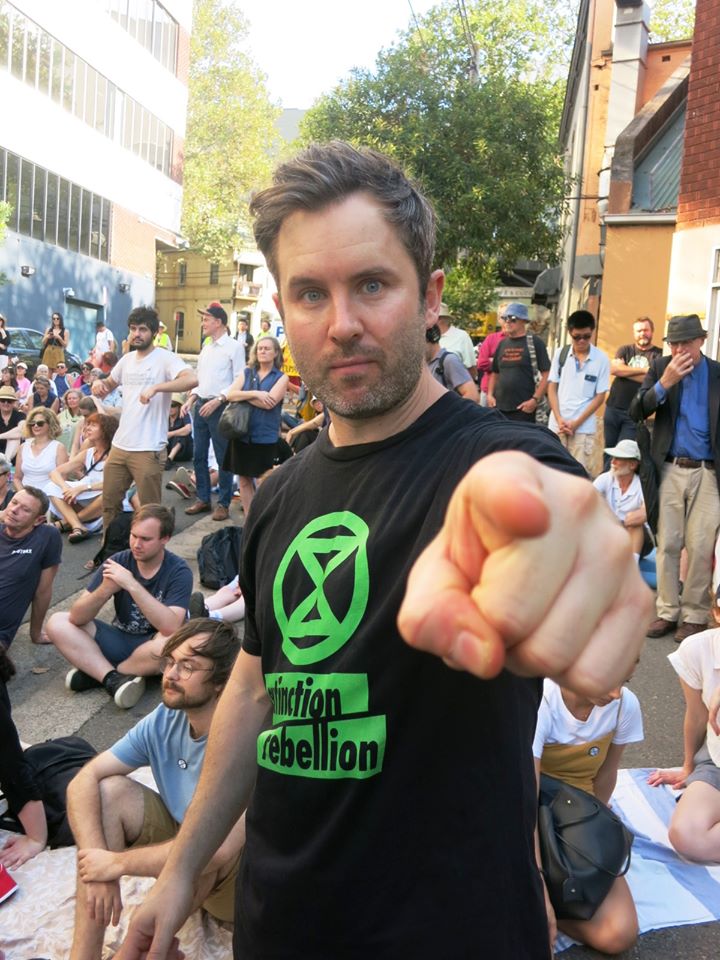
Firstly, since we’re stuck in lockdown, Extinction Rebellion has decided to launch a series of online actions, which began on Monday. AJ, broadly speaking, what does the Digital Rebellion entail?
It’s a chance for our rebels to protest from home for ten days. They have a new action every day. We’re encouraging them to make mischief online to challenge the toxic system we have.
We’re targeting industries and government, and also trying to spread kindness and build community, through these different activities.
These include a swarm of the big four banks’ social media accounts to tell them to get out of fossil fuels.
There are email blitzes, an online rally, a mass choir and a koala action, which is a viral campaign to draw attention to the loss of habitat.
As well as the protest actions the Digital Rebellion involves a component of mutual aid. Could you fill us in on what Rebel Aid is all about?
It’s for us to build connections and more resilient communities. Obviously, Extinction Rebellion is known for causing disruption and being seen to get angry about the climate crisis.
But, we know that if we are going to build a better world, the positive change involves building more resilient communities.
In practise, what that looks like is we’re delivering flyers to our neighbours to offer help during the COVID crisis.
We’re trying to help our rebels build online groups amongst their neighbours – through WhatsApp or email – to create connective communities within their streets and neighbourhoods.
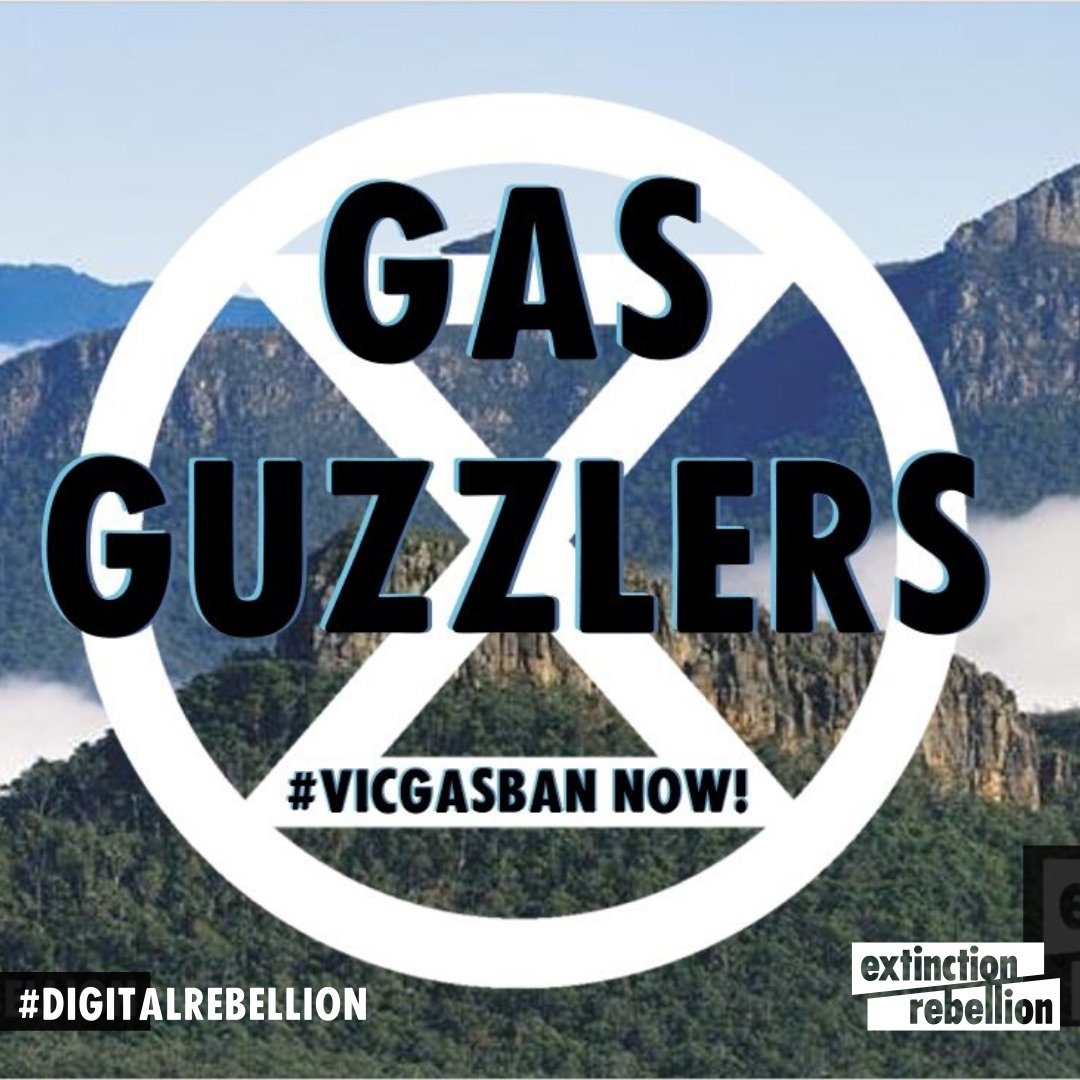
XR is drawing attention to the climate and ecological crisis the planet is in the grips of. This is being caused in large part by the fossil fuel industry.
In your understanding, has the damage that fossil fuels cause been halted by the lockdown?
I had thought that it had gone down and that this was a bit of a beacon to people of what it could be like.
But, the reality is the levels haven’t really gone down. Individual behaviour has changed, but the large structures, like electricity generation, haven’t changed at all.
So, we’ve got less cars on the road – there are less planes in the sky. But, the electricity sector continues to burn insane amounts of fossil fuels, and the CO2 concentration, which is the important measure, continues to not just go up, but accelerate.
So, we’ve learnt that the solution is not going to be people staying at home in their living rooms or driving their cars a bit less. It’s still about making giant changes through government and industry.
Australian governments have stepped up to the challenge that COVID-19 posed by shutting down society in a way that many couldn’t have imagined.
What do you think about the contrast between the response to the COVID crisis and the way the government has handled the climate crisis tells us?
It shows that governments can do big drastic, even unpopular, actions when they want to. But, at the moment, we can see when it comes to the climate crisis, they simply don’t want to.
There are lots of reasons for that. There are many powerful interest groups that don’t want the systems to change or for us to reduce emissions.
When governments continue to be concerned about how they look in the next three months – not in the next three or thirty years – then most politicians and leaders are happy to pass the buck down the line.
The Morrison government wasn’t looking so well following the bushfires, but its popularity has certainly picked up during the lockdown.
Are you concerned that an emboldened Coalition will simply return to its business as usual fossil fuel agenda following the pandemic?
It’s a huge concern. Extinction Rebellion wants to come back from this lockdown and fight against this.
Those politicians are going to tell a story that to rebuild our economy we need to do more mining, more logging and more destructive practices.
I think about it in this way: if the old shed in your backyard falls down, you don’t build the old same shack. You build something better, something stronger and something more resilient.
So, we’re going to keep shouting the message that the experts, the scientists, and even a lot of the economists are calling for, which is don’t rebuild the same old dirty system – build a better, cleaner and more resilient economy.
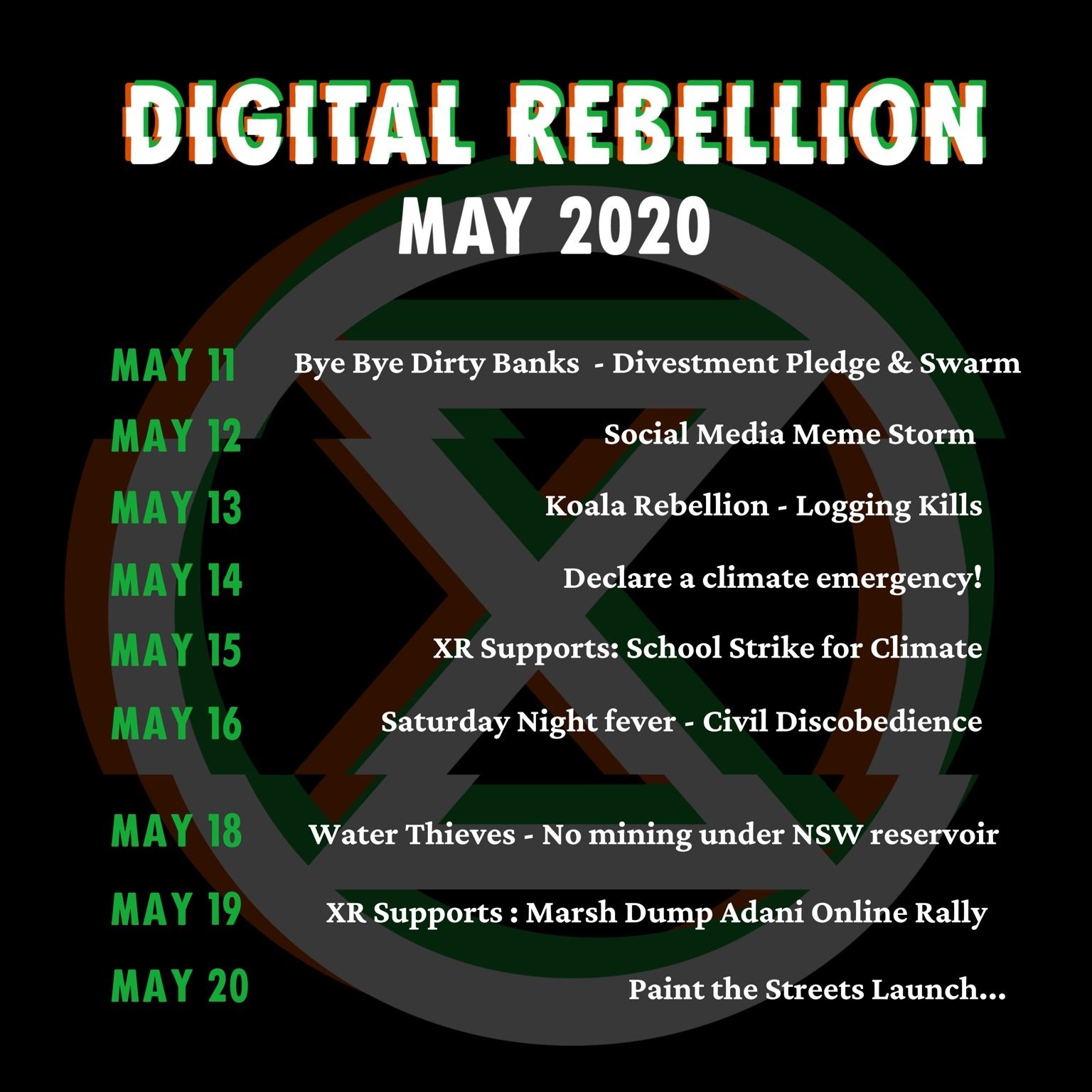
XR is a global movement. Right before COVID-19, the climate issue was gaining prominence.
Are their concerns amongst the movement that the current situation has led the cause to lose some of its headway?
It absolutely has in a couple of ways. The media attention has dropped right off Extinction Rebellion and the climate crisis. It’s only been interested in one story, which does feel disheartening.
Extinction rebels have been having the same anxieties, fears and difficulties that everyone else in society has faced. And the reality is that this climate journey is going to go up and down.
We’ve still got the same gains that we’ve made. We’ve got a growing movement with more and more people getting on board.
We know the tactics that we’ve been using work. And we’ve actually got even better online systems now in terms of the way we connect, organise our actions and hold meetings.
So, we can now run a really tight ship both in public on the streets and also online.
And lastly, AJ, around the time the Digital Rebellion comes to an end, more of the pandemic restrictions are set to be lifted.
What should the public expect from Extinction Rebellion after society begins going back to some semblance of what was considered normal prior to the lockdown.
We’re not really prepared to let things go back to normal. Not business as usual anyway.
We’ve got thousands of rebels around the country who have been stuck at home and are pretty fired up to get back out there as soon as restrictions are lifted.
Of course, we hope this online rebellion makes some noise, and does connect and heal some people.
But, as soon as we get back out there on the streets, we can do what we do best, which is cause disruption, have a bit of theatre and challenge the powers that be. So, we’re ready to go.


